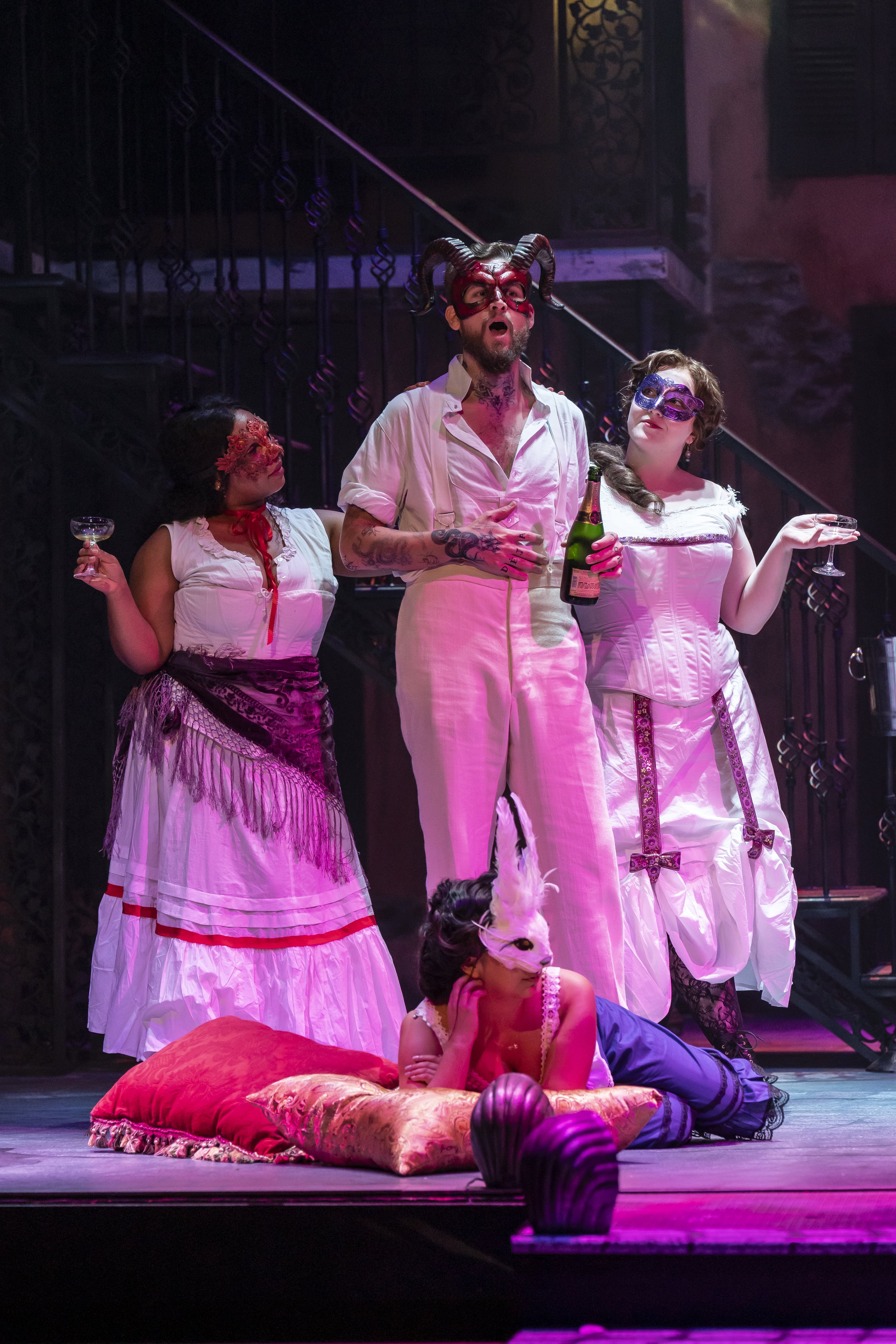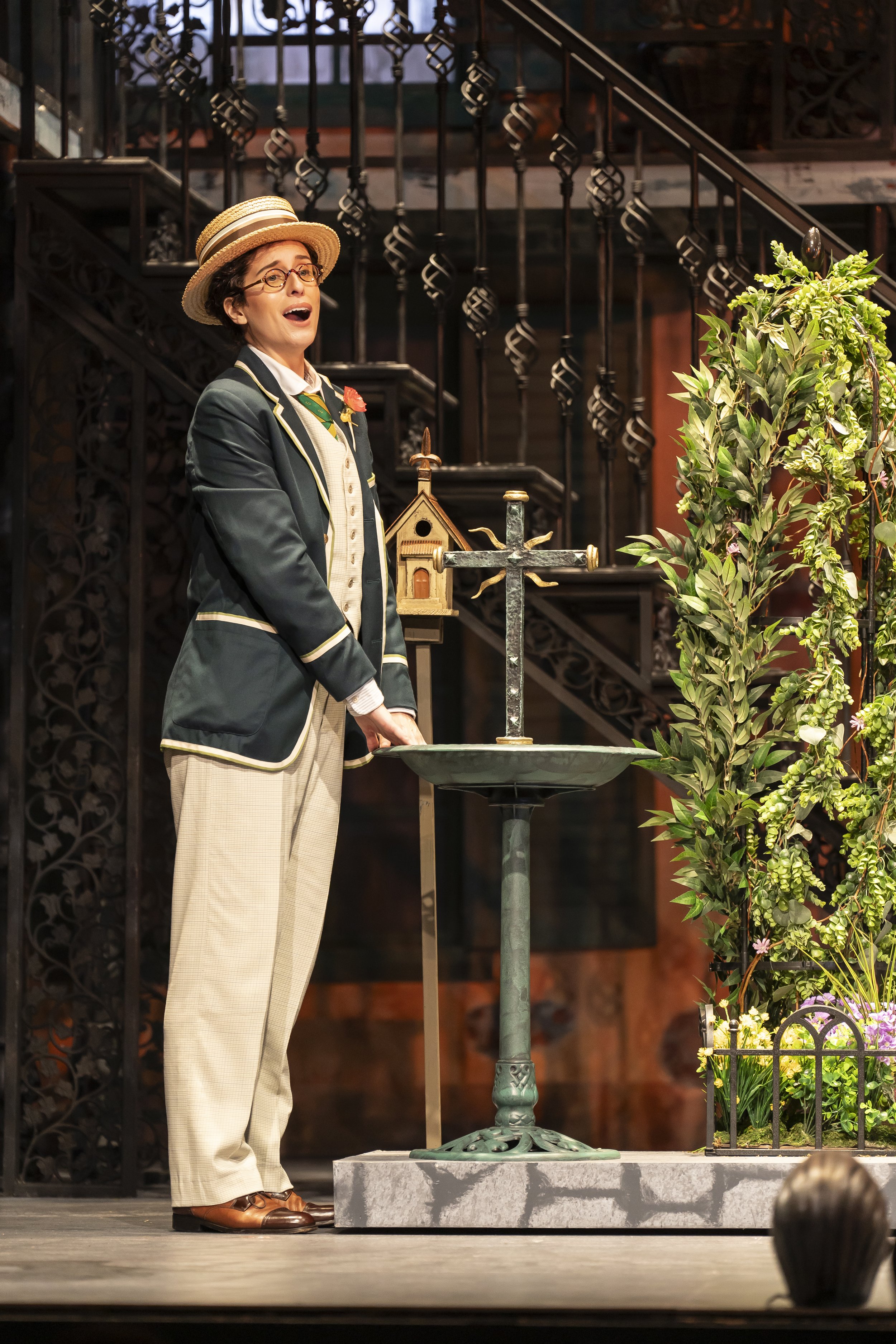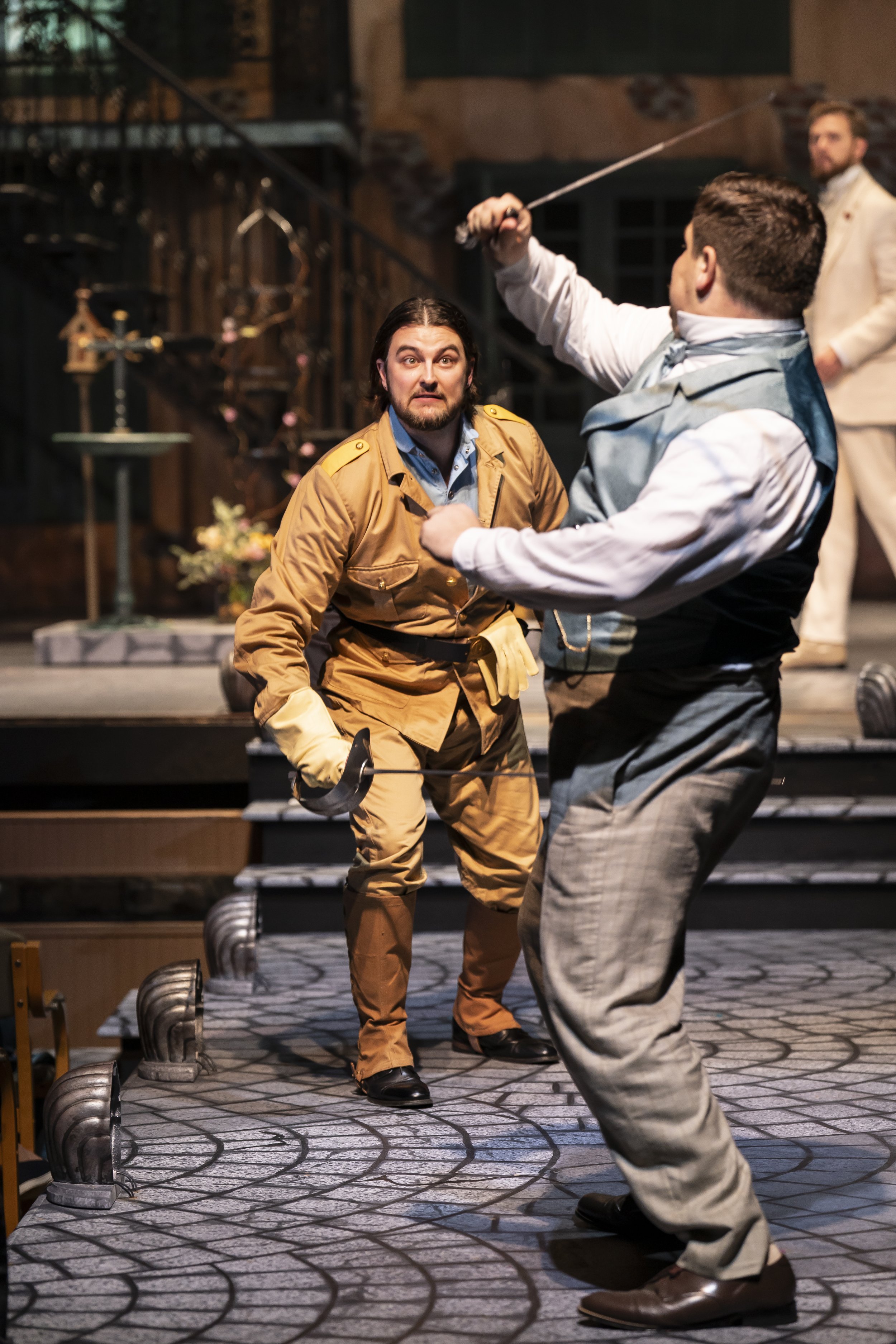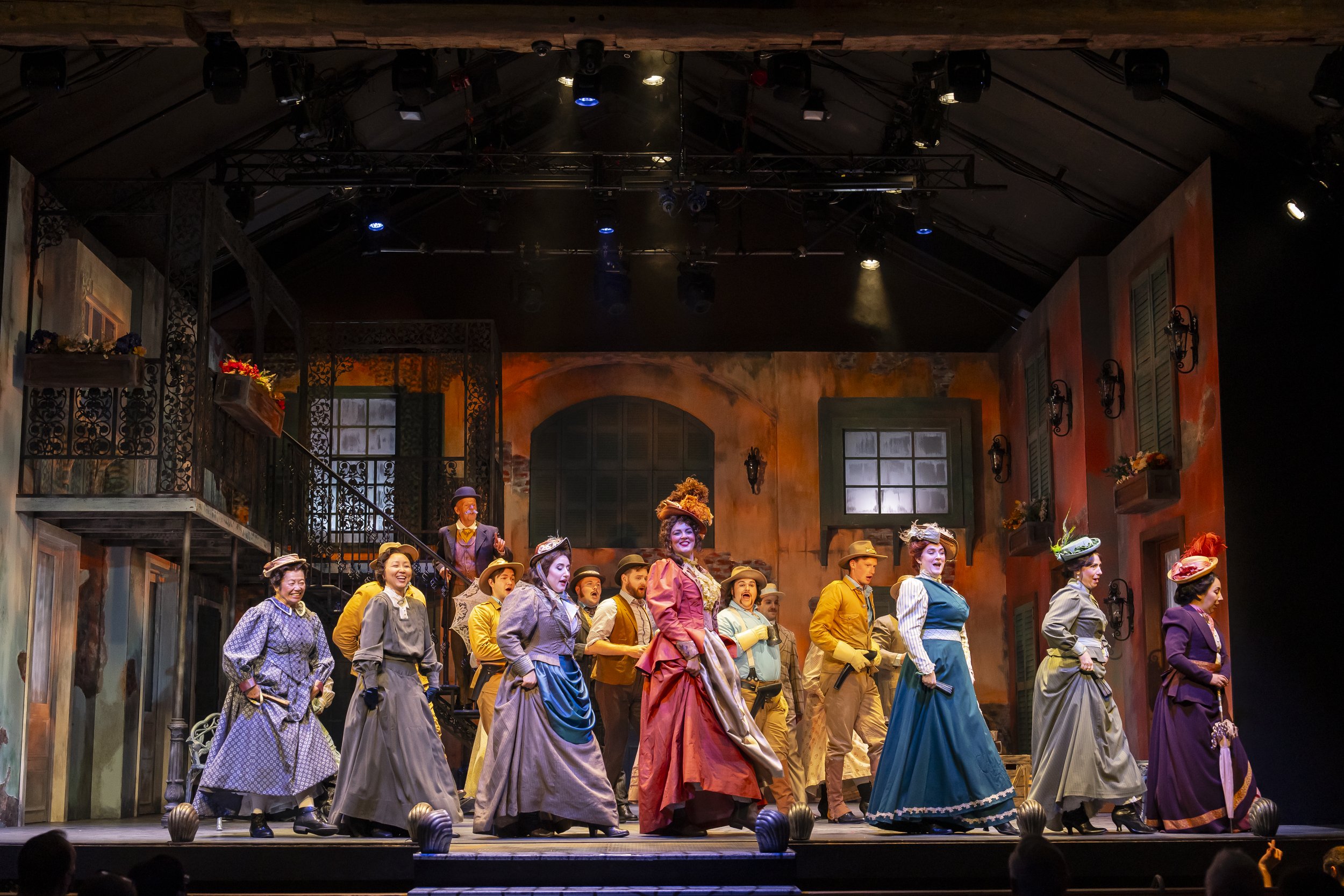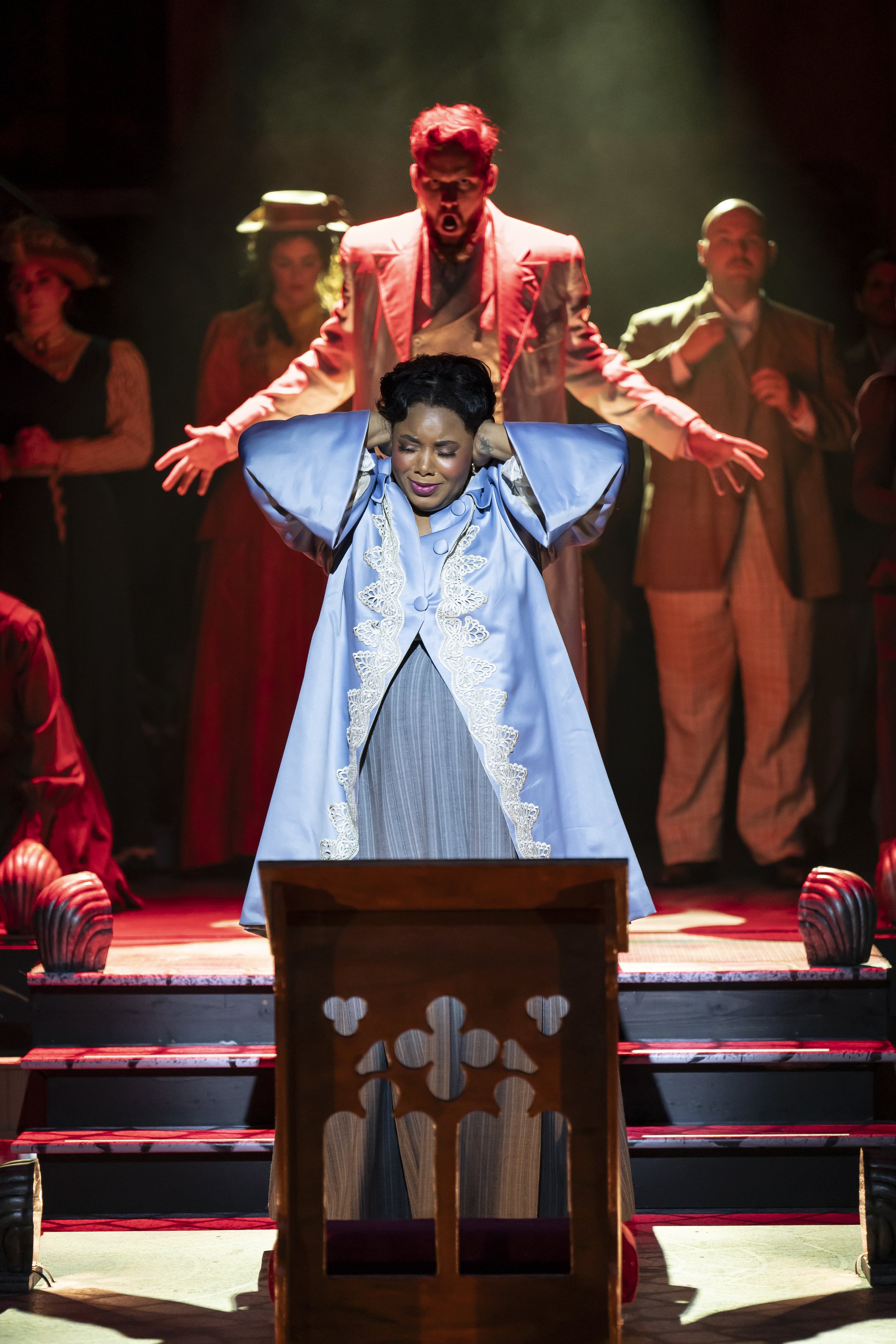There are two things that make summers in DC bearable, Wolf Trap Opera and air conditioning, and when attending opera performances in The Barns at Wolf Trap, you get both. That’s not all, with their current showing of Charles Gounod’s Faust (1859), you get one of WTO’s best ever. If Wolf Trap Opera was a restaurant, Faust would earn them a Michelin star, maybe two. Even The Bear might be envious.
The treats begin before the performance starts. To bring the storyline closer to American audiences, Director Alison Moritz has cleverly set WTO’s Faust early in the 20th century in New Orleans (in an American story with dark undertones, where else?); I remember Ms. Moritz for her creatively staged Così fan tutte in 2022 for Washington National Opera. The character Marguerite has been modeled on Marie Catherine Laveau, a Voodoo Queen “known within her community for her contribution to women’s causes, acts of service to prisoners, and care for the sick”. The stage has been transformed into a stylish, French Quarter residence in New Orleans with a runway that juts out into the center of the audience, fun for those with tickets but cutting down a bit on attendance; the runway also goes over the orchestra pit at the mid-point, adding to the challenge for Conductor Geoffrey McDonald, a WTO veteran, who had to stand to the right side of the pit, a bit more difficult for line of sight to the singers and half the orchestra. However, the traffic of performers on this inlet accentuates a special benefit of attending opera in The Barns. The Barns is smallish, cozy, and intimate and for Faust has singers trafficking down the middle of the audience; it’s quite an experience hearing the soprano singing her aria practically in your lap; you are not going to get that at the Met. Kudos to Scenic Designer Lawrence E. Moten III for an attractive, thematic set, and bringing us even closer to the action.
The elderly Dr. Faust (Eric Taylor) contemplating his demise. Photo by Scott Suchman; courtesy of Wolf Trap Opera.
As the music begins and the lights come up, an old Dr. Faust is seated at his desk, drinking and contemplating suicide, morose that pleasures of youth are gone; he is alone and questioning his life, cursing God, seeing nothing ahead except an empty road to death. Satan, never one to miss an opportunity, appears in his room to make Faust an offer he can’t refuse. Well, he could but Mephistopheles conjures a vision of the beautiful Marguerite and promises him the youth to win her; just sign away his soul on the dotted line. Warning: don’t try this at home; this is always a bad, bad, bad bargain. Faust is to receive help from Satan above and serve his bidding below. Faust succeeds in seducing Marguerite, impregnates her, abandons her, and with Mephistopheles’ magic, kills her brother Valentin, who dies cursing his sister. Satan tries to banish Marguerite to hell. She resists, goes insane, and kills her baby for which she goes to prison. Again, Satan tries to take her down, but she resists, prays to God, dies, and Angels announce she is accepted into heaven. Faust realizes his destruction of Marguerite, for whom he had genuine feelings of love, or maybe only she did for him. The Devil had to resign himself to only getting one out of two. Through Marguerite, faith and goodness triumphed. This is a big opera being performed in a small space and Director Moritz does an outstanding job moving the players around and the story along. The ending might have been made a little clearer for those unfamiliar with the story. At the end, Faust is distraught on the stage, left to go to hell with the knowledge he has ruined Marguerite’s life, but you might also wonder, the way it is played, if perhaps Marguerite’s love for him, expressed again when he visits her in prison, has allowed him to escape the worst of his fate. Also, the penultimate scene that showed Faust being serviced in a demonic bordello, Big Easy style, made hell more appealing than I was expecting, a little late in the opera; surely this was meant to explain why he abandoned Marguerite. Overall, the libretto offers up one of those stories that doesn’t hold up to scrutiny, but it is excellent theater and fun opera. Its sins are forgivable because the plot is held together and made to work by Gounod’s beautiful, lyrical melodies, one after another.
Marguerite (Brittany Logan) in a time of innocence. Photo by Scott Suchman; courtesy of Wolf Trap Opera.
The cast for Faust was outstanding as a group. All the roles with one exception were played by Wolf Trap Opera Filene Artists, a talented group of emerging artists who already have accumulated professional experience and accolades; they were selected for additional training in competitions across the U.S; then, WTO’s operas are selected to match the talents of each year’s selectees. Although Gounod’s opera is loosely based on Part I of Goethe’s immortal poem and play of the same name, the opera is mainly derived from librettist Michel Carre’s play, Faust et Marguérite; Jules Barbier was co-librettist for the opera.
Two views of Mephistopheles (Wm. Clay Thompson), as the dapper bargain-maker for human souls on earth and as the leader of his demon lair below. Photos by Scott Suchman; courtesy of Wolf Trap Opera.
Before moving on to offer accolades for the excellent cast and performances, let me hand a couple out for Costume Design and Wig & Makeup Design to Lynly Saunders and Priscilla Bruce, respectively. Not only did they help established the time and period, they embellished the storytelling and were a visual treat in their own right. This aspect might have gotten WTO over the hump in getting that Michelin star. Also maintaining the edge of quality for all aspects of this performance was the lighting design by Colin K. Bills, showcasing aspects of heaven and hell as well as life on earth.
Photo 1: Siébel (Mary Beth Nelson) sings of her love for Marguerite. Photo 2: Valentin (Kyle White) duels with a youthful Faust (Eric Taylor) as Mephistopheles (Wm. Clay Thompson) looks on. Photos by Scott Suchman; courtesy of Wolf Trap Opera.
The role of Dr. Faust was played by versatile tenor Eric Taylor who had two roles to play, Faust as an old man and Faust as a young man. He acted and sang well in moments of both passion and despair. He will soon appear as Pinkerton with Detroit Opera and Houston Grand Opera. Marguerite is a central character in Faust the opera, and her tussle with Satan is its central element. That assessment was strongly bolstered by the outstanding performance of soprano Brittany Logan in that role. With the audience so close, acting becomes almost as important as singing in The Barns, and Ms. Logan was pitch perfect in both; her range from low to high notes had pinpoint control with impressive fluidity, and her acting was superb as a shy, young beauty, a budding coquette charmed by jewels, and a fallen woman in despair. Ms. Logan was a Lindemann Young Artist with the Metropolitan Opera and will make her debut at the Met this Fall as Anna in Nabucco. Mephistopheles was played by bass Wm. Clay Thompson who has trained at the Ryan Opera Center of the Lyric Opera of Chicago. Dressed in angelic white, he was impressive singing and acting devilishly, whether entreating his victims or showing explosive rage. This trio of emerging artists were outstanding, whether singing in solo arias or in ensemble numbers.
Costumes, costumes, costumes as Marthe (Kathleen Felty, center) joins the ensemble in a dance. Photo by Scott Suchman; courtesy of Wolf Trap Opera.
The supporting cast was also excellent. Mezzo-soprano Mary Beth Nelson in a pants-role played Siébel, a young man hopelessly in love with Marguerite. She sang beautifully especially in a touching aria collecting a bouquet for her love. This performance was quite a contrast to her recent role as Rosina for Opera Baltimore’s and Opera Delaware’s The Barber of Seville, where she was also a delight. Tenor Kyle White sang the role of Valentin convincingly, exhibiting a warmth and beauty in his voice that made both myself and my wife wanting to hear more. We had previously seen his performance in Virginia Opera’s The Pirates of Penzance. For another contrasting performance, I offer up mezzo-soprano Katherine Felty who impressed in June as the Prince, a pants-role in WTO’s Semele; in Faust, she was a charming Marthe, a married friend of Marguerite’s who flirted with the devil. The soloist cast was completed by Studio Artist tenor Maria Manzo who was engaging as soldier Wagner. Additional WTO Studio Artists filled in as the chorus and supernumeraries.
Wagner (Mario Manzo) leads the ensemble in a song. Photo by Scott Suchman; courtesy of Wolf Trap Opera.
Of necessity, the score for WTO’s Faust was adjusted for a chamber-sized orchestra. That said, I thought Conductor McDonald and the Wolf Trap Orchestra played marvelously. Time and again when I noticed I found them in sync with the action on stage and providing Guonod’s embellishments beautifully. The WTO Chorus sang well on and off stage under the direction of Chorus Master William Woodard. Faust is a hits list of arias, and the orchestra delivered them with the full charm of Gounod’s lyricism. Bravi!
Mephistopheles (Wm. Clay Thompson) accosts Marguerite (Brittany Logan) in church, failing to banish her to hell. Photo by Scott Suchman; courtesy of Wolf Trap Opera.
Wolf Trap Opera has taken their productions to another level. I found WTO’s Faust to be filled with excellence at all levels from beginning to end. The singers, orchestra, and creative staff were all at the top of their game. It has been said that good opera intoxicates all the senses. Wolf Trap Opera’s Faust did that at the highest level. Yes, two stars, such quality deserves two stars. To get three stars, I think you would have to bring back Pavarotti.
The Fan Experience: Now the bad news – Performances of Faust were scheduled for July 21, 23, 27, and 29; the two remaining performances are sold out. You might try dropping by the box office to see if there have been any returns or checking Craig’s List online to see if anyone wants to sell their tickets. The opera is sung in French with supertitles in English shown overhead; with one intermission, run time was about 3 hours. WTO’s next fully staged production will be Don Giovanni in the Filene Center, on Friday, August 11; tickets remain for that performance.




